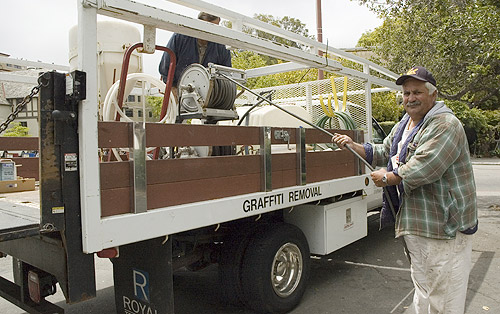Berkeleyan
 A rare daylight shot of PP-CS painter Mark Paulson and his graffiti-removal rig. (Wendy Edelstein photo) |
It's My Job
12 September 2007
 |
In this new semi-regular feature, the Berkeleyan showcases a staff member whose work is essential to the smooth functioning of the campus (or one of its many departments and units). Do you know someone whose job would interest our readers? Send an e-mail to berkeleyan@berkeley.edu with your suggestions.
Mark Paulson How long have you been working at Berkeley? What's your job? What does that involve? How big a part of your job is graffiti detail? How do you find out when a campus structure has been tagged? How do you remove graffiti? Why all the different equipment? What's the best time to catch you in action? Isn't graffiti cleanup never-ending? Has campus graffiti changed over the years?
Lead Painter, Physical Plant - Campus Services
I started doing mechanical work and painting cars 20 years ago, then moved to the painting department.
Two painters, myself and Steve Nunes, are responsible for maintaining the exterior of the campus.
We clean up graffiti, and also take care of deferred maintenance - painting light poles, fire hydrants, parking lots at Clark Kerr and Albany Village, red curbs, crosswalks. We're responsible for painting center lines on the streets from Grizzly Peak to Rimway.
I spend about 30 percent of my time on it. PP-CS spends between $100,000 and $200,000 a year to remove graffiti.
UCPD often calls to alert us. We also have an anti-graffiti hotline at 643-0890.
We have a flatbed truck equipped with paint, primer, graffiti remover, citrus-based cleaner, and a 3,000-pound pressure washer with a 150-gallon tank. If the tank runs out of water, we hook it up to a fire hydrant.
Different situations call for different approaches. We fill the pressure washer with various substances depending on what surface the graffiti is on. In some cases, water alone will do the trick. But on a poured cement wall, for instance, water won't remove the paint, so we'll use a mix of water and sand, which is better for cleaning abrasive surfaces.
We do most of that work in the early morning, like 4 or 5 a.m. The machine is pretty noisy, and we don't want to disrupt classes.
It's frustrating, because we're using maintenance time to address the problem. It seems like we're fighting a losing battle.
It used to be political. We saw a lot of that when George H.W. Bush was running for president, and also during the controversies surrounding propositions 187 and 209. Now it's just young kids tagging . mostly the rooftops of tall buildings, so they can see their work on Google Earth.

